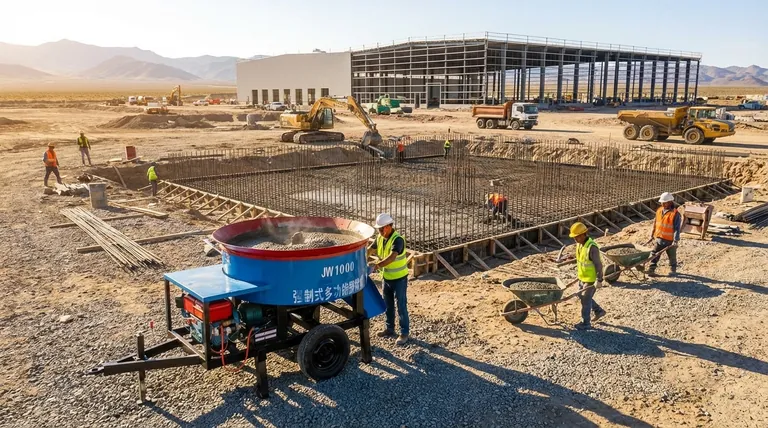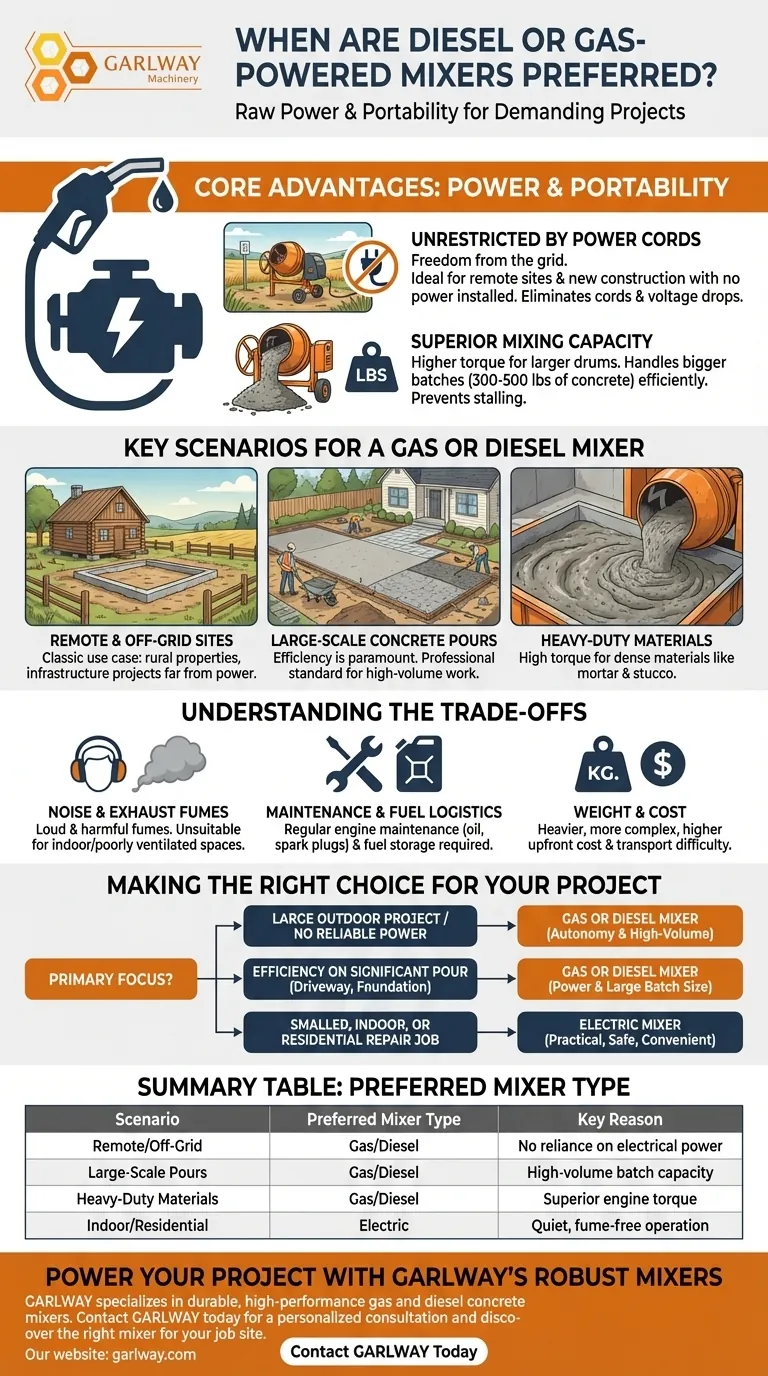Gas or diesel-powered mixers are the definitive choice for any project where complete portability and raw power are required. They are purpose-built for outdoor environments where electrical outlets are unavailable and are engineered to handle substantial volumes of material, making them essential for large-scale or remote job sites.
The decision between a gas/diesel mixer and an electric one is a fundamental choice dictated by your project's scale and location. While electric mixers offer quiet convenience for smaller jobs near a power source, gas and diesel models provide the untethered freedom and brute force necessary for serious construction work.

The Core Advantages: Power and Portability
The preference for gas or diesel mixers in certain scenarios comes down to two key characteristics that electric models cannot match.
Unrestricted by Power Cords
The most significant advantage is freedom from the grid. These mixers can operate anywhere you can take them, from new construction sites with no power yet installed to remote rural properties.
This complete portability eliminates the need for long, heavy-gauge extension cords, which can cause voltage drops and are often a tripping hazard on a busy worksite.
Superior Mixing Capacity
Gas and diesel engines deliver more torque, allowing them to turn larger drums filled with heavy materials without stalling.
They are designed to handle bigger batches, often mixing 300 to 500 pounds of concrete at once. This high capacity dramatically increases efficiency on large jobs, reducing the total number of batches required.
Key Scenarios for a Gas or Diesel Mixer
These advantages make engine-powered mixers the superior tool for specific types of demanding work.
Remote and Off-Grid Job Sites
This is the classic use case. Whether you are pouring footings for a cabin, setting fence posts on a large farm, or working on infrastructure projects far from established power, a gas or diesel mixer is essential.
Large-Scale Concrete Pours
For projects like driveways, large patios, sidewalks, or building foundations, efficiency is paramount. The ability to mix large, consistent batches quickly makes these mixers the professional standard for high-volume work.
Heavy-Duty or Stiff Materials
The high torque of a gas engine is crucial when mixing dense, low-slump concrete or other heavy materials like mortar and stucco. Electric mixers can struggle or burn out under such demanding loads.
Understanding the Trade-offs
While powerful, engine-driven mixers are not the right tool for every job. Their strengths come with clear downsides that must be considered.
Noise and Exhaust Fumes
Gas and diesel engines are loud and produce harmful exhaust fumes. This makes them entirely unsuitable for indoor projects or use in poorly ventilated spaces, where an electric mixer is the only safe option.
Maintenance and Fuel Logistics
Unlike a simple electric motor, these engines require regular maintenance, including oil changes, air filter cleaning, and spark plug replacements. You must also manage fuel storage and refueling on the job site.
Weight and Cost
Engine-powered mixers are significantly heavier and more complex than their electric counterparts. This results in a higher upfront purchase price and makes them more difficult to transport and maneuver.
Making the Right Choice for Your Project
Your project's location and scale are the two most important factors in this decision.
- If your primary focus is a large outdoor project without reliable power: A gas or diesel mixer is non-negotiable for its autonomy and high-volume capacity.
- If your primary focus is efficiency on a significant pour (like a driveway or foundation): The power and large batch size of a gas or diesel model will save you critical time and labor.
- If your primary focus is a smaller, indoor, or residential repair job: An electric mixer is almost always the more practical, safe, and convenient choice.
Ultimately, matching the mixer's capabilities to the demands of the job ensures your project runs smoothly, safely, and efficiently.
Summary Table:
| Scenario | Preferred Mixer Type | Key Reason |
|---|---|---|
| Remote/Off-Grid Job Sites | Gas/Diesel | No reliance on electrical power |
| Large-Scale Concrete Pours | Gas/Diesel | High-volume batch capacity |
| Heavy-Duty Materials (e.g., low-slump concrete) | Gas/Diesel | Superior engine torque |
| Indoor or Residential Jobs | Electric | Quiet, fume-free operation |
Power Your Project with GARLWAY's Robust Mixers
Choosing the right equipment is critical to your project's success. GARLWAY specializes in durable, high-performance construction machinery, including powerful gas and diesel concrete mixers designed for demanding contractors and construction companies.
Our mixers deliver the untethered power and reliability you need for large-scale, off-grid projects. Let us help you equip your team for maximum efficiency.
Contact GARLWAY today for a personalized consultation and discover the right mixer for your job site.
Visual Guide

Related Products
- Ready Mixer Machine for Construction Ready Mix Machinery
- Commercial Electric Concrete Mixer Machine HZS 50 Small Batch Plant for Sale
- Commercial Construction Mixer Machine for Soil Cement Mixing Concrete
- Hydraulic Concrete Mixer Machine Cement Mixing Equipment for Mixture Concrete
- Portable Concrete Mixer Machine Equipment for Mixing Concrete
People Also Ask
- Can a concrete mixer be used for mortar? Understanding the trade-offs for your project
- Which type of projects require a concrete mixer? Essential Guide for Construction Pros
- Why is cleaning a concrete mixer after use important? Avoid Costly Repairs and Ensure Quality
- What should be considered regarding the output of a concrete mixer? Match Capacity to Your Project Scale
- What is the average lifespan of a concrete mixer? Maximize Your Equipment's Lifespan & ROI


















